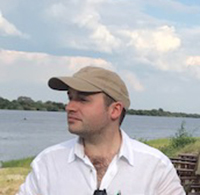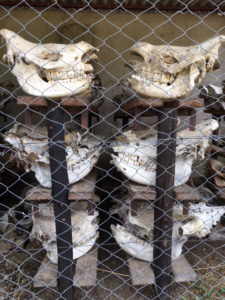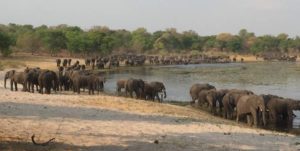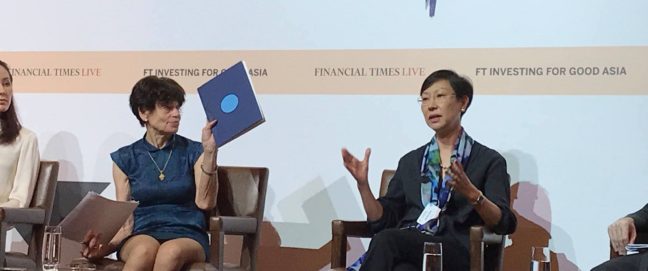
‘We’re not really looking for attention, we just want to get on with the job.’ Christopher Parker, Trustee of Oak Foundation
Interview: Christopher Parker, Trustee of Oak Foundation
Oak Foundation is probably not one of the first names which comes to mind when you think of major foundations, yet in terms of funding and influence, it is considerable. Active across the world and in fields as significant as the environment, human rights and child abuse, Oak nevertheless remains a family foundation. The Foundation’s most recently-appointed trustee, 28 year old Christopher Parker, tells Charles Keidan how it all fits together.
Where does the name Oak Foundation come from?
My grandparents came up with the name because the oak is a very strong tree that continues to grow. What my grandparents wanted was a foundation that continued to grow from generation to generation, reflecting the interests of those generations as it went on.
Was the name also chosen for reasons of modesty – that you wanted the focus to be on the people you support as opposed to the family?
I would say so. Part of our philanthropic model is that our grantees are the ones doing the hard work and they’re the ones who should be taking the credit. We’re in the background assisting them financially, or with capacity advice, or whatever they need; it’s different for each grantee.
Christopher joined the Board of Oak Foundation during the elephant and rhino poaching crisis, which inspired his interest in wildlife conservation.

Christopher joined the Board of Oak Foundation during the elephant and rhino poaching crisis, which inspired his interest in wildlife conservation.
You mention your grandparents and you’re obviously among the younger generation of family trustees. What’s your background and what has inspired you?
As a student, I did internships with UN and the Swiss embassy in Nairobi and then worked for a year with UNICEF in Uganda. It was at that time that I got more interested in wildlife conservation. It coincided with my joining the board and with the poaching crisis for rhinos and elephants, around 2014-15. I was also part of the environmentalist club at high school, so it’s something that’s been there since I was young. That’s how I started our programme on wildlife trade and conservation.
Also, since I was about 15, the family allowed us to make small discretionary grants. For example, one of the first I did was to a wildlife conservancy in Kenya called Lewa Conservancy which is known particularly for having a lot of Eastern Black Rhinos which are endangered. And another one was a Ugandan organisation called Uganda Youth Development Link (UYDEL) which worked with children who were involved in prostitution or doing drugs or living on the streets, helping them through a six-month programme of counselling and life and employment skills.
When did you become a trustee of the Oak Foundation?
In late 2014. The way it works is that you can only opt to join once you’re 25. The next generation – me, my siblings and cousins – will then gradually become stewards of the family’s philanthropic resources. Nobody is under any obligation to do it. If someone has their own career that’s fine. It would be difficult to be a full-time trustee and have a regular job, too, so for me, it’s full time. I supervise two programmes and, with the family, the entire Foundation. I’m in charge of illegal wildlife trade conservation and then the Joint India Programme. A few years ago, because many programmes were working in India separately, we thought it would be interesting to try to get everyone to work together. Now, there’s an internal staff group which includes one person from each of the following programmes: child abuse, women’s issues, environment, housing, homelessness and human rights, and we make grants together in two states in India on all those topics.
‘I think the founders realised early that it’s all well and good to want to help an organisation but people have to be paid and office rent has to be found and these things don’t happen by themselves. So, for me, providing organisations with core support where appropriate has never been a question.’
We have another, similar programme in Brazil now, too. It was an innovative approach to how we work, because a lot of times it’s easy to get siloed within programmes, and we’ve extended the reach of our India programme, we’re looking into the Sundarbans, too. The Brazil programme is focussed particularly in the Recife metropolitan area.
We’re supporting grassroots groups to fight injustice like having industrial slums or chemical waste on their doorstep.
How do you find your partners?
We have three staff on the ground in India and one in Brazil but the way we do most of our grantmaking is looking for people who are connected to us through other grantees or other funders. Having people on the ground is good, even if it they are not permanently based in the area, but are just getting out into the field – that’s really when you start to find these kinds of organisations, especially the small ones.
What’s extraordinary about Oak is that you’re relatively little-known despite working across continents, having a developed infrastructure for your grantmaking, and giving over $200 million a year. Why do you think that is the case?
We’re not really looking for attention, we just want to get on with the job. The amounts do fluctuate and we have also started giving specific large grants. For example, four years ago, we gave an exceptionally large grant of $75 million to ClimateWorks, which is the biggest we’ve ever given. We hope to continue supporting this organisation, which is doing great work to help mitigate the effects of climate change.
Why did you choose that organisation and that particular cause?
When you’re giving that large a sum of money, the due diligence has to be extremely intensive and not many organisations could handle that amount without its distorting them internally. ClimateWorks can. It’s used to it; it has such a vast array of programmatic knowledge and skill that it can work across the whole spectrum of climate change.
When Alliance magazine devoted a whole issue to climate philanthropy in 2016, we reported that only two per cent of funding goes to address climate change head on. I talked to your colleagues at Oak at the time and they emphasised the need to bring other funders on board. How’s that going?
I think being high-profile is not the most effective way to do that. What we’re doing is individual peer-to-peer conversations. I believe we are seeing results in terms of more funds coming through. But it’s always an uphill battle. There are always people fighting against it, whether they don’t believe it or they have an alternative agenda.
What’s also striking is your willingness to provide core funding and infrastructure support on issues you’re concerned about – I’m thinking particularly about your human rights work and the way you’ve supported infrastructure organisations like Ariadne.
I think the founders realised early that it’s all well and good to want to help an organisation but people have to be paid and office rent has to be found and these things don’t happen by themselves. So, for me, providing organisations with core support where appropriate has never been a question. If you really want to have a long-term effect in a particular field, you have to build it, and it takes years to do it. Most of our programmes have been going for 10-plus years and started from relatively small budgets which have grown. Reading the grants and being at the board meetings, you can see the evolution, not just in the grantees that come back for new grants, but also in what we’re doing and the effect that’s having on the field.
Do you think that because you can play both a support and convening role, you can have real impact on the issues that you’re dealing with?
Yes, I believe that working together is key to this or any other issue. There’s still a lot of competition among funders and among not-for profit organisations. If we can get people talking more, that’s the way forward. Ultimately, with both climate and conservation, we are on a timer because at a certain point there is no return, so we need to act fast and change that.

Oak Foundation works with organisations to help stop illegal trade.
Can you give me an example where a collaborative approach has paid off?
One concrete example was in East Africa. Organisations we supported to work together in Tanzania, Zambia, Malawi and Zimbabwe were able to connect the work of agencies in their countries, which has strengthened wildlife conservation efforts in that region.
Another approach you use is backing social movements, which is relatively unusual for foundations, who sometimes struggle in this area. How did that come about?
It has come about largely through our programme on issues affecting women. That was started by my grandmother, who was open to trying new things, because she really wanted to make a difference and it’s thrown up some fascinating examples. A regranter we’ve supported in the Balkans for a number of years has gone from being a small organisation to one that works in multiple countries, providing not just funds but support for grassroots organisations which help women suffering sexual or domestic abuse and work with authorities to try and improve laws or law enforcement for those women.
How does decision-making work at board level?
We have a rolling system of grants, so we approve them throughout the year. We have two board meetings a year, where each programme does a presentation which could be a grant presentation, an expert panel (usually three people) on a specific topic or a general update on the programme and the situation.
These must be really in-depth board meetings if you’ve got seven programmes and each of them is doing one of those types of presentation?
They last three days!
And has doubling your grantmaking from $100 to $200 million over the last decade been made possible by the knowledge of the fields and the partnerships you’ve developed?
Actually, I think last year we were at $220 million and in 2007 we had been at $72 million. There are two reasons we’ve been able to increase so much. One is that every year the budgets have increased for all the programmes. Obviously over ten years, 10 to 20 per cent for each programme adds up. Also, we’ve begun making larger grants as I said earlier. As we’ve become known as experts in our fields, it enables us to do initiatives which are focussed on specific things. Just now, we are working on a grant looking at education in Hawaii which, in terms of the ranking in the US overall, is quite low. So the initiative wants to improve that, but it also wants to engage people in for example maritime affairs, which is an important part of its economy.
Some family foundations also bring in non-family trustees, either people with particular expertise or grant beneficiaries as a way of sharing power. Has there been any debate about that in your family?
No. It’s run by the family and will continue to be run by the family. We have what’s called an advisory panel which includes three people plus the president, but they have no voting power.
Clearly, there’s a combination of the family’s interests with a strategic approach at a professional level. How does that fusion work between the professional team and the family’s wishes?
Each programme is directed by the director, but then overseen by a specific Trustee. Obviously the trustees are all informed about their programmes. We work with the staff to come up with the strategies and individual grants, so we have quite a hands-on approach.
How do you set the amounts that you give?
Each programme has its pre-allocated budget. Every five years, we sit down and we figure that out. We work on a figure of between a 5 and 20 per cent annual increase up to a cap.
Does that depend on how your investments go?
Not really. We’ve never decreased any amounts. Our environmental grantmaking, for instance, has stopped growing, so the amount grows with interest at 1 per cent a year, but not by 5 to 20 per cent.
Do you try to align the way you make your investments with your grants?
We’ve taken a closer look in terms of climate issues and energy-related investments, but we’ve not gone down the social entrepreneurship investment route, because investments are handled by a team of specialists.
‘I think there is a core belief in human rights, in the right of people to make decisions for themselves and not to live in poverty or with disease. I don’t think of those as political issues, just something that everybody should believe regardless of their political views.’
Is there any interaction between the people that manage the investments and the people that make the grants?
Not at the staff level. The person who runs the investment side comes to board meetings once a year, but there’s no staff interaction between the two.
What do you see or hope to see happen in the foundation over the next ten years as you and possibly your siblings come on board as trustees?
I think as a foundation we’ll continue to grow, perhaps at a slightly slower rate, because we’re getting to an apex in terms of the number of staff we’d ideally like to have, which is around 100 people. I think we’re somewhere around 80 people now. Beyond that, it becomes a different style of organisation. That’s why we’ve been looking at larger initiatives and also some infrastructure projects, where you don’t have to recruit extra people.
Physical infrastructure?
My grandparents recently made a grant to the Royal Marsden Hospital for £25 million to build one of their cancer centres. That wasn’t part of a programme. Trustees can make grants that fall outside of the thematic programmes, a sort of ‘anything else’ category! My grandparents have been supporters of medical research, particularly cancer, and the Royal Marsden for a long time.
The words ‘social justice’ appear quite a lot on your website and annual reports. Do you see yourselves as broadly liberal politically or does it depend on which member of the family you’re talking to?
No two people are the same in terms of politics. I would say everyone is probably – if you want to talk conservative and liberal – mostly liberal, but along the spectrum of liberal, there’s people on different ends.
How does it inform your philanthropy?
I think there is a core belief in human rights, in the right of people to make decisions for themselves and not to live in poverty or with disease. I don’t think of those as political issues, just something that everybody should believe regardless of their political views. Sometimes campaigning and policy work does involve engaging with various political entities, but we’re not here to dictate to them or to say they’re good or bad, just to explain these are the issues and in our professional opinion this is what needs to be done and that we’d like to help them with that.



Comments (0)
Gerold C. Wunderlich Just now I’m at the Victoria Falls Hotel looking out at the Zambezi and reflecting on tomes spent with your grandfather in Hawaii and Hong Kong working with DFS. PLEASE forward my regards to him and to Jetta Hakuna Matata, Jerry Wunderlich
Just now I’m at the Victoria Falls Hotel looking out at the Zambezi and reflecting on tomes spent with your grandfather in Hawaii and Hong Kong working with DFS. PLEASE forward my regards to him and to Jetta Hakuna Matata, Jerry Wunderlich